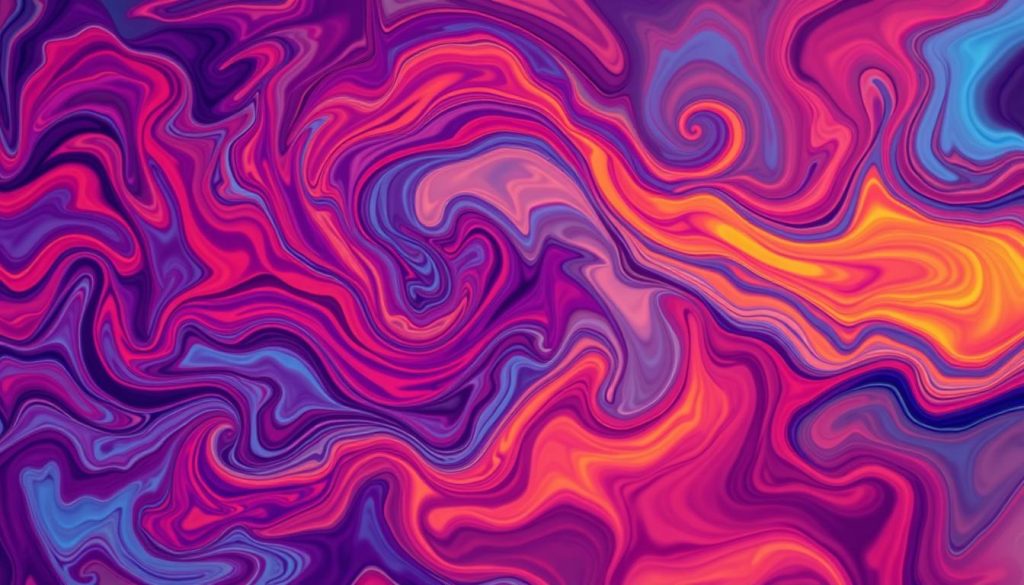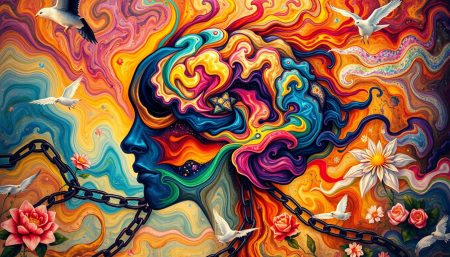Mental health is always changing, making it key to understand conditions like manic depression. Known also as bipolar disorder, it brings on mania episodes and depressive ones. Each has its own set of challenges.
Knowing about manic depression is crucial for those who live with it and their loved ones. Mood swings can disrupt life, but they can also spark creativity.
Today, we see manic depression through personal stories and medical knowledge. Empathy is what connects us, showing the real impact of these mood swings. It’s not just about mood swings; it’s about how they change a person’s world.
Key Takeaways
- Manic depression, or bipolar disorder, involves powerful mood swings.
- Understanding the disorder requires sensitivity to the personal stories of those affected.
- Effective treatment for manic depression combines medical approaches with lifestyle adaptations.
- Symptoms can manifest distinctly in mania episodes and depressive episodes.
- Insight into manic depression symptoms is crucial for supporting health and well-being.
What is Manic Depression?
Manic depression, also known as bipolar disorder, is a mental health condition. It causes extreme mood swings. These swings include feeling very high (mania episodes) and very low (depressive episodes).
Overview of Bipolar Disorder
Bipolar disorder changes mood and energy a lot. People can feel very high or very low, and sometimes feel normal. These mood swings can mess with sleep, energy, and thinking clearly.
Some people have these episodes often, while others rarely do. Between episodes, some people may feel okay, while others may still feel emotional.
Differences Between Manic and Depressive Episodes
Knowing the difference between mania and depression is key to managing bipolar disorder. Manic episodes make people feel very high, energetic, or irritable. They might talk a lot, think fast, and change their behavior a lot.
Depressive episodes make people feel very sad or hopeless. They might not have energy, feel worthless, and lose interest in things. They might even think about suicide.
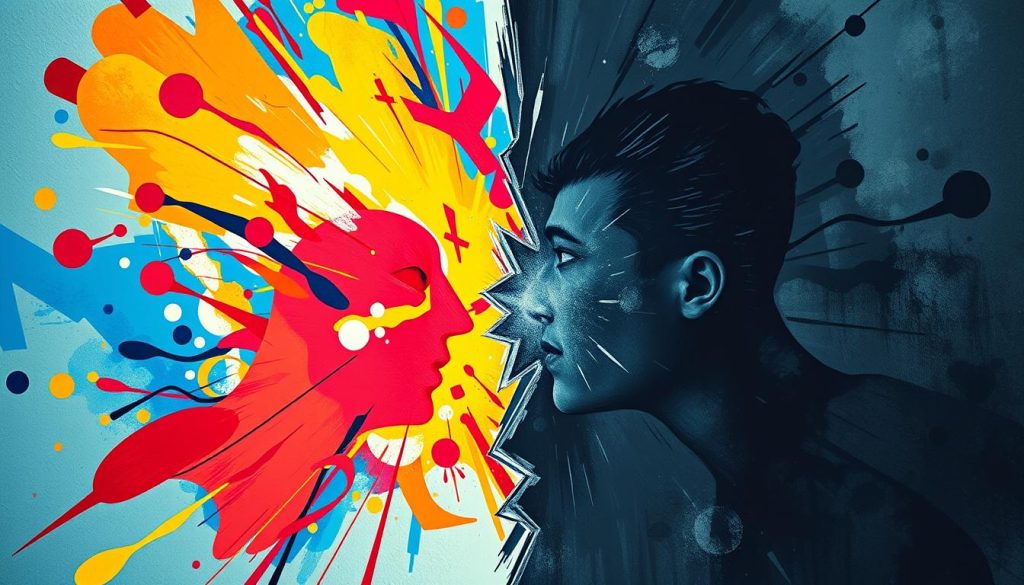
The difference between these states is hard for both the person and those around them. It can cause problems in personal and work life. To treat it well, it’s important to know and understand both types of episodes.
In short, knowing the signs of bipolar disorder and understanding the difference between episodes is crucial. It helps manage the condition and improve life for those affected.
Common Symptoms of Manic Episodes
Manic episodes in bipolar disorder are marked by high mood and energy. These symptoms include racing thoughts, increased activity, and impulsive behavior. Let’s explore these symptoms in detail.
Elevated Mood and Energy Levels
People in a manic episode feel very optimistic and full of energy. They might have racing thoughts and plan a lot without thinking it through. This can also disrupt their sleep, causing sleep disturbances.

Increased Activity and Hyperactivity
Manic episodes bring a surge in activity. This goes beyond normal excitement, turning into hyperactivity. People do many things at once, without a plan. This can make them feel irritable because others can’t keep up.
Impulsive Behavior
Impulsivity is a key feature of manic episodes. People might make quick decisions, like buying things on impulse or starting new projects. This behavior is linked to irritability and racing thoughts, leading to restlessness and potentially harmful actions.
| Symptom | Behavioral Manifestation | Impact on Daily Life |
|---|---|---|
| Racing Thoughts | Fast, uncontrollable flow of ideas | Disruption in focus and sleep |
| Sleep Disturbances | Inability to maintain regular sleep patterns | Daytime fatigue and decreased effectiveness |
| Impulsive Behavior | Engaging in risky activities without forethought | Potential financial or social repercussions |
| Irritability | Short-tempered reactions and frustration | Strain in personal and professional relationships |
It’s important to understand these symptoms. This knowledge helps individuals, their families, and caregivers. They all play a key role in the treatment process.
Common Symptoms of Depressive Episodes
In the world of manic depression, knowing about depressive episodes is key. These episodes are much more than just feeling down. They are deep lows that need careful attention and management.
Persistent Sadness and Hopelessness
Feeling sad and hopeless is a big sign of depressive episodes. This sadness doesn’t go away like normal sadness does. It deeply affects a person’s life and daily activities.
Fatigue and Loss of Interest
Fatigue is a big problem during depressive episodes. It’s not just feeling tired, but feeling emotionally and mentally drained too. Also, losing interest in things you used to enjoy is common.
Difficulty Concentrating
People with depressive episodes often find it hard to focus. Even simple tasks seem too hard. This can hurt work and personal relationships.

Dealing with sleep disturbances and mood swings is important. Seeing these as signs of depression, not just bad days, is key. Adding holistic practices to your life can help. Learning about brain health can also help manage these symptoms.
| Symptom | Impact on Daily Life | Potential Interventions |
|---|---|---|
| Persistent Sadness | Affects emotional and social functioning | Counseling, Medication |
| Fatigue | Reduces physical activity and motivation | Dietary adjustments, Sleep hygiene |
| Difficulty Concentrating | Impairs work and academic performance | Cognitive behavioral therapy, Mindfulness practices |
Knowing about these symptoms in manic depression is crucial. Recognizing the depth of depressive episodes helps people get help early. This can greatly improve their life quality.
How Symptoms Manifest in Daily Life
People with manic depression face big challenges in their daily lives. Mood swings, irritability, and episodes of mania and depression make things tough. These issues affect not just personal activities but also relationships and work.
Impact on Relationships
Mood swings and irritability can really strain relationships. During mania, people might seem too happy or irritable, which can be hard for those around them. When they’re depressed, they might pull away and lose interest in things, causing distance and confusion.
Effects on Work Performance
At work, manic episodes can start with a burst of energy and productivity. But then, focus can fade, and depression can set in. This up-and-down cycle can make it hard to keep a job and build a career.
Changes in Social Behavior
Social behavior changes a lot, affecting who people hang out with and how they feel about socializing. During mania, they might take risks, and when they’re depressed, they might pull away. These changes can confuse both the person and their friends, making it hard to get the support they need.
“Navigating daily life with manic depression requires understanding, support, and often professional guidance to manage the extreme highs and lows experienced by those affected.”
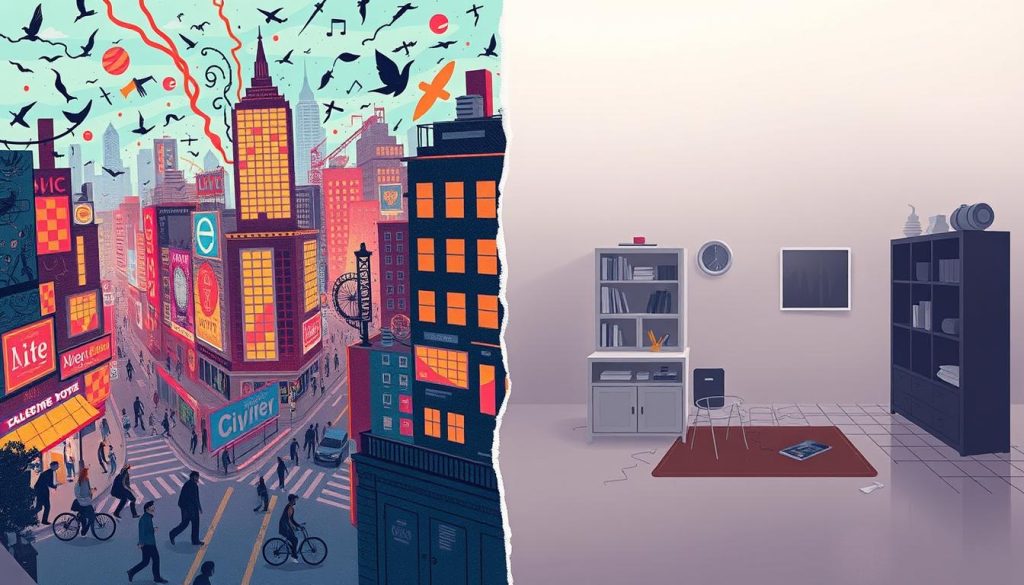
| Aspect | Impact during Mania Episodes | Impact during Depressive Episodes |
|---|---|---|
| Relationships | Impulsive, often erratic engagement | Withdrawal, lack of communication |
| Work Performance | Initially high then unpredictably low productivity | Persistent disinterest and reduced productivity |
| Social Interaction | Increased sociability or inappropriate behaviors | Social withdrawal and isolation |
Diagnosing Manic Depression
Understanding manic depression symptoms and bipolar disorder signs is key for a correct diagnosis. A detailed diagnostic process confirms the patient’s experiences and guides treatment. Spotting mood swings linked to manic depression is complex and needs expert skills and specific tools.
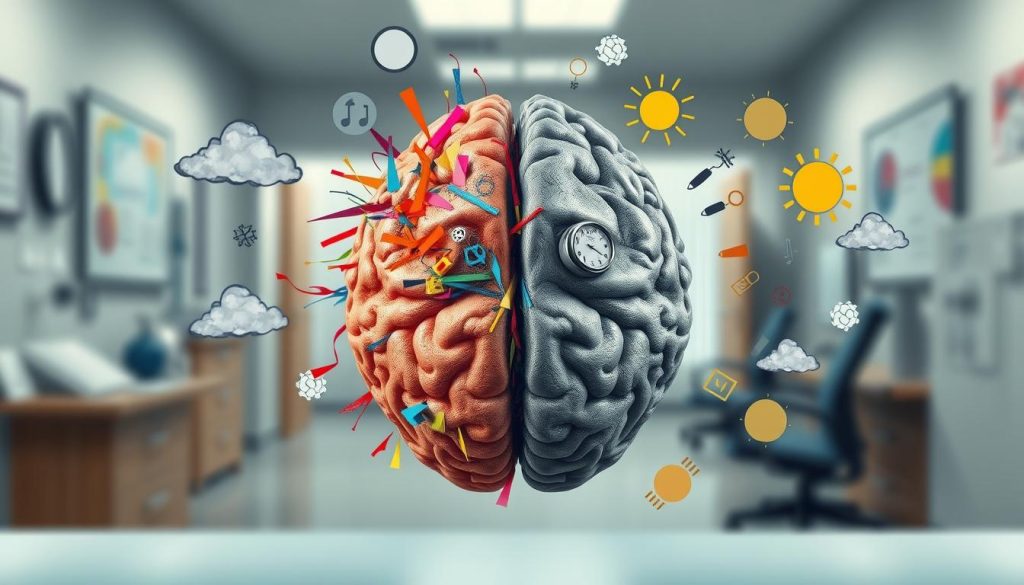
Importance of Diagnosis
Getting manic depression right is very important. It makes sure people get the right help and support, which can greatly improve their life. If it’s wrong, treatments can be not just useless but also dangerous.
Tools and Criteria Used by Professionals
Mental health experts use many tools and criteria to spot manic depression. These methods help tell apart normal mood changes from those of bipolar disorder. This ensures a clear and accurate check-up.
| Diagnostic Tool | Purpose | Details |
|---|---|---|
| Psychological Evaluation | Assess mental state | Done through interviews and questionnaires to look at behavior and mood swings. |
| Mood Charting | Track mood variations | Patients log their daily moods and what causes them, spotting manic depression patterns. |
| DSM-5 Criteria | Standard diagnostic reference | Follows the Diagnostic and Statistical Manual of Mental Disorders for bipolar disorder. |
With these tools, experts can better figure out if mood swings point to manic depression. This helps lead to the right help and care.
Who is Affected by Manic Depression?
Manic depression, also known as bipolar disorder, affects many people. It’s important to know who is most at risk. This helps us provide better support and care.
Demographics and Statistics
Manic depression doesn’t pick favorites. It can hit anyone, anywhere in the world. But, some groups are more likely to be affected.
| Demographic Group | Prevalence Rate |
|---|---|
| Adults (18 and older) | Approx. 2.8% annually |
| Adolescents (12-17 years old) | Approx. 2.9% annually |
| Gender Distribution | Females (3.3%), Males (2.6%) |
Age of Onset
The first signs of bipolar disorder signs often show up in late teens or early twenties. But, symptoms can start even earlier. Catching it early is key to helping those affected.
Co-occurring Conditions
Understanding manic depression means looking at other disorders too. These conditions can make diagnosing and treating bipolar disorder harder. They can hide or make symptoms like mood swings and sleep problems worse.
Anxiety Disorders
Anxiety often goes hand in hand with manic depression. It makes mood swings harder to handle. Treatment needs to be careful, using both medicine and therapy.
Substance Abuse
Substance abuse is common with bipolar disorder. People might use drugs or alcohol to feel better. But, it only makes things worse, needing special treatment plans.
Personality Disorders
Personality disorders often happen with manic depression. They can make bipolar symptoms harder to treat. This makes it tough for patients to act and interact with others.
| Condition | Impact on Manic Depression | Considerations for Treatment |
|---|---|---|
| Anxiety Disorders | Increases frequency and intensity of mood swings | Combined psychotherapy and medication |
| Substance Abuse | Aggravates sleep disturbances; escalates mood instability | Integrated treatment for dual diagnosis |
| Personality Disorders | Complicates social interactions and stability | Long-term psychotherapy, potential medication adjustments |
Treatment Options for Manic Depression
Managing manic depression symptoms needs a plan made just for you. It includes medicines, talk therapy, and changes in your lifestyle. This mix helps control mood swings and improves your life quality.
Medications
Medicines are often the first step in treating manic depression. Mood stabilizers, antipsychotics, and sometimes antidepressants are used. They help keep neurotransmitter levels balanced, reducing extreme highs and lows.
Psychotherapy
Talk therapy is key in dealing with mood swings. It uses methods like cognitive-behavioral therapy (CBT) and interpersonal therapy. These help change negative thought patterns and improve relationships.
Lifestyle Changes
Making lifestyle changes can help a lot. Getting regular sleep, eating well, and staying active are good for your mind. Stress-reducing activities like yoga and meditation can also help.
| Treatment Type | Benefits | Considerations |
|---|---|---|
| Mood Stabilizers | Reduce frequency of mood swings | Requires monitoring for side effects |
| Antipsychotics | Help manage manic episodes | Potential for long-term side effects |
| Antidepressants | Improve depressive symptoms | Risk of triggering manic episodes |
| Cognitive-behavioral Therapy | Develops coping strategies | Time commitment for regular sessions |
| Interpersonal Therapy | Improves personal relationships | Requires active participation |
| Lifestyle Adjustments | Enhances overall health | Needs consistent effort |
Managing Manic Depression Symptoms
Living with manic depression means you need to be proactive to stay stable. It’s important to find ways to handle mood swings and irritability. Building strong coping strategies and a supportive network is key.
Coping Strategies
Managing manic depression involves controlling impulsive behavior and fatigue. These steps can help you feel better and function better every day.
- Mindfulness and meditation exercises to manage mood swings and anxiety.
- Regular physical activity to reduce irritability and improve overall mood.
- Adequate sleep schedule to combat fatigue and stabilize energy levels.
- Journaling or engaging in creative outlets to process impulsive thoughts and emotions in a controlled environment.
Building a Support System
Having a strong support network is crucial for managing manic depression.
- Family and friends who are informed and understanding of the condition.
- Participation in support groups with peers who share similar experiences.
- Maintaining regular appointments with mental health professionals.
| Coping Skill | Benefit |
|---|---|
| Mindfulness | Decreases stress and enhances emotional regulation |
| Exercise | Boosts mood and energy levels, reduces anxiety |
| Sleep Hygiene | Improves concentration and emotional stability |
| Journaling | Facilitates catharsis and personal insight |
| Support Groups | Promotes a sense of community and shared healing |
By using these coping strategies and building strong relationships, you can manage manic depression better. This leads to a more stable and fulfilling life.
Seeking Help: When to Reach Out
Knowing when to get help for manic depression is key. It’s important to recognize the signs. This helps individuals get the support they need on time.
Signs That Indicate Professional Help is Needed
Severe highs or lows can really affect your life and relationships. If these symptoms last a long time and get in the way of your daily life, it’s time to seek help. Here are some signs to look out for:
- Feelings of worthlessness or excessive guilt during depressive episodes
- Drastic changes in mood or behavior from mania episodes
- Difficulty managing daily tasks or maintaining relationships
- Inability to concentrate or make decisions
How to Approach a Healthcare Provider
Talking to a healthcare provider can be scary, but being ready helps. Keep a record of your symptoms and how they affect you:
| Symptoms | Frequency | Impact on Daily Life |
|---|---|---|
| Extended periods of depression | Daily/Weekly | High – Affects work and personal interaction |
| Heightened energy or irritability | Periodically during mania episodes | Moderate to high – Leads to impulsive decisions |
Telling your healthcare provider about your experiences is important. It helps them find the best ways to help you. This way, you get the support you need.
Living with Manic Depression
Living with manic depression is tough, but many find ways to manage it. They use perseverance and a detailed treatment plan. Despite the ups and downs, they find joy and purpose in their lives.
They learn to cope with the lows and use the highs to their advantage. This journey is about growth and achievements, not just survival.
Long-term Management
Managing manic depression means understanding mood changes and finding balance. It’s about sticking to medication, therapy, and a healthy lifestyle. Regular sleep, a balanced diet, and stress reduction are key.
Having a supportive healthcare team is crucial. They help adjust treatments and tackle new challenges. This leads to a better life.
Success Stories and Inspiration
Success stories inspire us, showing what’s possible beyond the diagnosis. These tales come from support groups and media. They share victories and real-life experiences.
They show the strength of the human spirit. For more on brain health, check out this article on dementia and Alzheimer’s. It sheds light on the complexities and triumphs of cognitive health.
FAQ
Q: What are the primary symptoms of manic depression?
A: Manic depression, or bipolar disorder, causes extreme mood swings. These can include feeling very happy and energetic, or feeling very sad and tired. It affects how people act and think, making it hard to live a normal life.
Q: How can manic episodes impact daily life?
A: Manic episodes can cause people to make rash decisions and take big risks. This can lead to financial problems and hurt relationships. It also makes it hard to sleep and can make daily tasks more challenging.
Q: What are the signs of a depressive episode?
A: A depressive episode makes people feel very sad and hopeless. They might feel extremely tired and lose interest in things they used to enjoy. It can also change how they eat and sleep, making it hard to do everyday things.
Q: What should I do if I suspect someone has manic depression?
A: If you think someone has manic depression, encourage them to see a doctor. Being supportive and understanding is very important. Talk to them about the benefits of getting professional help.
Q: Can manic depression be successfully treated?
A: Yes, manic depression can be treated. Doctors use medicines, therapy, and lifestyle changes to help. With the right help and support, people can live happy and fulfilling lives.
Q: How is manic depression diagnosed?
A: Doctors diagnose manic depression by talking to the person and looking at their history. They might also use mood charts and do physical exams to rule out other causes.
Q: Who is at risk for developing manic depression?
A: The exact cause of manic depression is not known. But, certain things can increase the risk. These include family history, brain structure, and stress. It can happen to anyone, but often starts in late teens or early twenties.
Q: What other conditions commonly co-occur with manic depression?
A: People with manic depression might also have anxiety, substance abuse, or other disorders. These can make managing manic depression harder and need to be treated too.
Q: Are there specific lifestyle changes that can help manage manic depression?
A: Yes, besides medicine, lifestyle changes can help. These include regular sleep, exercise, stress reduction, avoiding alcohol and drugs, and having a strong support network.
Q: When should someone with manic depression seek help?
A: If mood swings start to affect daily life, it’s time to seek help. It’s also important to get help if thoughts of harming oneself or suicide come up.












